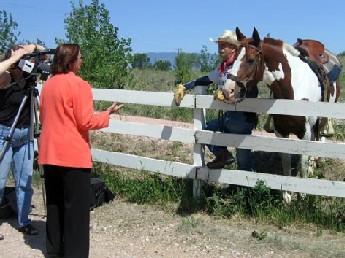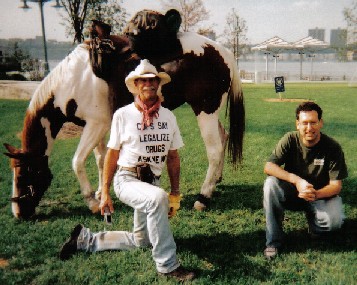Feature:
Former
Lawman's
Coast
to
Coast
Horse
Ride
to
Legalize
Drugs
Concludes
at
Statue
of
Liberty
10/14/05
He looks the part of the stereotypical Texas lawman: long, tall, lanky, dressed in cowboy boots and jeans with a big, shiny belt buckle. But the message Howard Wooldridge took to the highways and byways of America for seven months this year was hardly typical. "Cops Say Legalize Drugs -- Ask Me Why" is the provocative message emblazoned on his t-shirt, and Wooldridge rode some 3,600 miles from California to New York City trying to get the anti-prohibitionist message out.
Wooldridge's cross-country trek ended with a 15-mile saunter down New York City's Broadway before culminating in a final press conference in the shadow of the Statue of Liberty. While a Texas lawman leading his horse down Broadway impressed the tourists, said Wooldridge, native New Yorkers kept their big city cool. "Most of them just pretended we weren't even there," he said. "'What horse? I don't see any horse,' they said. It was just bizarre, and it also reminded me of that whole big city thing. This is a city of eight million people and I felt alone. It was kind of spooky for a country boy like me." A veteran of 18 years as a Texas police officer, Wooldridge, 53 and now retired, is a founding member of Law Enforcement Against Prohibition, the fast-growing conglomeration of cops and ex-cops who have seen first-hand the futility of drug prohibition and who are now calling for the drug war to be replaced with a system of regulated access to currently illicit substances. While LEAP has made a name for itself through its members' strong presentations to law enforcement and service organizations, Wooldridge's was a unique effort to carry the message across the heartland, winning converts one by one out on the lonely highway, at rest areas, roadside cafes, camp sites, and watering holes. But it wasn't all one on one. Some 11 to 12 million people had an opportunity to hear Wooldridge's message, given the size of the media markets he passed through, Wooldridge and LEAP spokesman Mike Smithson said. Wooldridge, his horse, and his provocative t-shirt were a natural draw for small town papers all along the route, more than 50 of which printed stories about him and his cause. Local radio and television outlets also bit, with Wooldridge reporting about 30 TV appearances and a like number of radio spots. The former Texas lawman also managed more than 50 appearances before groups like Rotary Clubs, and once the academic year kicked into gear last month, he also addressed numerous classes and other groups on college campuses.
An article did appear in the New York Times, but that was a fluke and the coverage was less than flattering, said Smithson. "We got that article only because a stringer happened to run into Howard and interviewed him, and the article treated him as if he were Don Quixote tilting after windmills." Still, despite the failure of the big city press to pay much attention, Wooldridge is convinced the word got out and he is exhilarated by the responses he's received. "It was positive responses all across America," said Wooldridge. "A couple of cops got pissed off, and one even flipped me off, but the civilians of the country were very positive. People came out to invite us to their ranches, people stopped by to bring us coffee and donuts. Riding a horse across the country is hard work, but that saddle was a lot easier to sit in when you knew you were reaching out and being a positive force for change -- and getting such a positive response. It was really heartwarming," he said. "America knows three things," said Wooldridge. "This war on drugs ain't working, prisons are worthless for doing anything about it, and nobody wants to spend tax dollars to put people in jail for personal amounts of any illegal drug. Beyond that, the most common reaction was 'I'm not sure I agree with you, but you make some sense.'" Those generally positive reactions mark a sea change from just a few years ago, when Wooldridge first began publicly challenging drug war orthodoxy. "When I first started doing this six years ago, people would say I was a lunatic or an asshole, but now the overwhelming majority say 'I agree with you' or at least 'What you're saying makes sense,'" said Wooldridge. "America now accepts that prohibition is a failed policy. Everybody knows it." That is a very encouraging sign, he said. "I'm starting to think we are actually going to do it, actually end drug prohibition. It may take another eight or 10 years, but I think America has taken the first step. It's like going to Alcoholics Anonymous. The first thing you have to do is admit you have a problem: 'Hello, my name is America, and I now realize I am addicted to a failed war on drugs.'" "This has been a great tour," said LEAP's Smithson. "Howard did hundreds of interviews and spoke to thousands of people, and we were just as well-received in the red states as in the blue states. We got attention from the Associated Press. We got attention from Fox News, as well as local Fox affiliates. We got a whole hour on Wisconsin public radio. We got a lot of attention, although not as much as we would have liked." The attention was also reflected in web site hits for LEAP, said Smithson. "It's been through the roof, averaging about 35,000 a day for the last few weeks and up to 60,000 our first day in New York. Now it's back down to 20-22,000 hits a day, but its been a real boon for LEAP, and now we've got other media sniffing around." Of course, it wasn't just Wooldridge and his horses. In addition to the LEAP team that set up countless meetings and press interviews, Wooldridge also had the help of Oklahoma NORML's Norma Sapp ("NORML Norma from Norman"), who accompanied him in an RV provided by the November Coalition. And there were other volunteers across the country, some of whom provided food or lodging, others who merely joined the procession for a few miles. While Wooldridge has spent the two out of the last three summers riding across the country with his anti-prohibitionist message, he's now hanging up his spurs and taking his show from the road to the halls of Congress. "I'm going to be a lobbyist for LEAP in DC," he said. "I'll put on my best cowboy hat and shiniest belt buckle, and do what I can to end the drug war. I'll draw from my experience in Austin, where I lobbied for Texas NORML. I expect the best I'll be able to do at first is to take a bad paragraph out of a bad bill here and there, but eventually I'll be able to build up trust and relationships with congressmen and their staffers and we'll be able to move to offense."
| |||||||||||||||||||||||||||||||||||||||||||||||||||||||||||||||||||||||||||||||||


